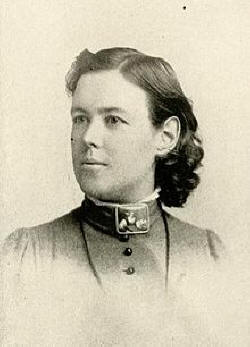

Queer Places:
Vassar College (Seven Sisters), 124 Raymond Ave, Poughkeepsie, NY 12604
Greenwood Memorial Park & Mortuary, 4300 Imperial Ave, San Diego, CA 92113
 Dr.
Charlotte Johnson Baker (March 30, 1855 - October 31, 1937) was the first
woman physician to practice medicine in San Diego, California. She practiced
obstetrics and gynecology at St. Joseph's Hospital, where her husband, Fred
Baker, MD, was a general practitioner. The Bakers were the first
husband-and-wife physicians in San Diego.
Dr.
Charlotte Johnson Baker (March 30, 1855 - October 31, 1937) was the first
woman physician to practice medicine in San Diego, California. She practiced
obstetrics and gynecology at St. Joseph's Hospital, where her husband, Fred
Baker, MD, was a general practitioner. The Bakers were the first
husband-and-wife physicians in San Diego.
She was born Charlotte Le Breton Johnson in Newburyport, Massachusetts on March 30, 1855. She graduated from Newburyport High School in 1872, and after a year teaching, she attended Vassar College in 1873. During this time she was an instructor in gymnastics. She graduated from Vassar in 1877 with a Bachelor of Arts. In the fall of 1879, she attended the medical department of the University of Michigan; she received her M.D. in 1881. She returned home to Newburyport, then married Dr. Frederick "Fred" Baker (29 January 1854 – 16 May 1938) on March 30, 1882. In that year they moved to Akron, Ohio, where they practiced medicine, before moving to Socorro, New Mexico, where their two children, Mary Caroline and Robert Henry, were born. In January 1888, the Baker family moved to San Diego, California, where she and her husband became successful physicians, settling in Roseville in the Point Loma area. In that year she also received a A.M. from Vassar College for special work in optics and ophthalmology done after graduation.[1][2] She was the first woman elected president of the San Diego County Medical Society.[3]
Baker was a noted suffragist and one of two civic-minded women who spearheaded the San Diego Women's Vote Amendment campaign. She worked to eliminate prostitution and advocated a shorter work week for laborers.[4] She favored women's suffrage, and identified herself with Woman's Christian Temperance Union and many other movements for advancing women individually, socially and politically.[1] She also served as president of the San Diego Equal Suffrage Association. For the San Diego Women's Vote Amendment campaign, she and other supporters campaigned at Allen's decorated automobile for a tour of San Diego's back country. They spoke from benches while the people ate their lunches, in Oceanside. They made their way through Escondido, Fallbrook, and Ramona, while presenting their views and distributing literature. They believed that women would feel valued if they knew their opinions were valued.[5] When the amendment came to a vote in the state of California the outcome looked bleak. When reporters asked Baker for her opinion on the outlook of the amendment, she replied:
On October 16, almost one week after the election, Baker received a phone call from the City Clerk telling her to go ahead and register. She did so and had herself and three other women sworn in as deputies so they could begin registering others.[6]
Dr. Charlotte also shared a common interest in education, woman and science with Ellen Browning Scripps and Dr. Mary Ritter. Mary and Charlotte gladly supplied Miss Scripps with information and provided plenty of suggestions for projects in need of contributions. This relationship strengthened all three. Miss Scripps had eyes into the community; Drs. Baker and Ritter gained the prestige of being known as friends of a wealthy philanthropist; while their physician husbands (and Ellen’s brother E.W. Scripps) often received the credit for their good efforts while deflecting criticism from the ladies’ progressive charities.
My published books: